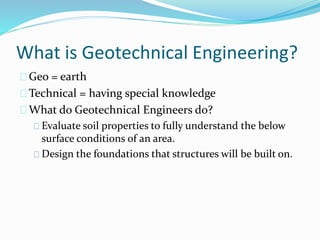More About Geotheta
More About Geotheta
Blog Article
The Definitive Guide for Geotheta
Table of ContentsThe Ultimate Guide To GeothetaThe Ultimate Guide To GeothetaThe Single Strategy To Use For GeothetaMore About GeothetaLittle Known Questions About Geotheta.

They conduct site examinations, accumulate samples, carry out research laboratory tests, and examine data to assess the viability of the ground for building and construction tasks - Consulting Engineer. Based upon their searchings for, geotechnical designers give recommendations for foundation layout, incline stability, retaining structures, and mitigation of geotechnical hazards. They work together with other experts, such as architects, structural designers, and construction groups, to make certain that geotechnical considerations are incorporated right into the overall project design and application
By evaluating the actions and residential or commercial properties of dirt and rock, they can recognize potential geotechnical hazards such as landslides, soil negotiation, or incline instability. Their proficiency aids protect against failures or crashes that might threaten lives and residential property. Right here are some detailed duties and duties of a geotechnical designer: Site Investigation: Geotechnical engineers conduct site examinations to collect data on subsurface conditions.
They analyze the information to understand the properties and habits of the dirt and rock, including their toughness, leaks in the structure, compaction features, and groundwater conditions. Geotechnical Evaluation and Style: Geotechnical engineers analyze the data gathered throughout website examinations to analyze the security and viability of the site for construction jobs. They execute geotechnical estimations and modeling to examine variables such as birthing capability, negotiation, incline stability, side planet stress, and groundwater flow.
Indicators on Geotheta You Should Know
Foundation Layout: Geotechnical designers play an important role in designing foundations that can securely support the desired structure. They assess the soil problems and tons demands to figure out the suitable structure type, such as superficial foundations (e.g., grounds), deep foundations (e.g (https://www.pubpub.org/user/ian-hammond)., piles), or specialized techniques like soil improvement. They consider aspects such as negotiation limitations, bearing capacity, and soil-structure interaction to create optimum foundation designs
They assess building and construction plans, monitor site tasks, and perform area examinations to verify that the style suggestions are followed. If unforeseen geotechnical concerns develop, they evaluate the situation and give referrals for remediation or modifications to the design. Threat Evaluation and Reduction: Geotechnical engineers assess geotechnical hazards and threats related to the job site, such as landslides, liquefaction, or dirt erosion.

Cooperation and Interaction: Geotechnical engineers work very closely with various other experts associated with a project, such as architects, architectural engineers, and construction groups. Effective interaction and partnership are vital to incorporate geotechnical considerations right into the general project layout and building process. Geotechnical engineers offer technological competence, answer queries, and make sure that geotechnical requirements are fulfilled.
More About Geotheta
Right here are some sorts of geotechnical engineers: Foundation Engineer: Structure engineers focus on creating and analyzing foundations for structures. They analyze the soil conditions, tons demands, and website attributes to establish one of the most proper structure type and style, such as shallow foundations, deep structures, or specialized techniques like stack structures.
They examine the elements affecting slope stability, such as dirt homes, groundwater problems, and incline geometry, and develop strategies to avoid slope failings and reduce threats. Quake Designer: Earthquake engineers specialize in evaluating and designing frameworks to withstand seismic pressures. They assess the seismic risk of a site, assess dirt liquefaction potential, and create seismic layout criteria to ensure the safety and security and resilience of structures throughout quakes.
They carry out area screening, gather samples, and analyze the gathered information to define the dirt properties, geologic developments, and groundwater problems at a website. Geotechnical Instrumentation Designer: Geotechnical instrumentation engineers concentrate on surveillance and gauging the behavior of dirt, rock, and structures. They set up and keep instrumentation systems that monitor variables such as soil settlement, groundwater levels, incline motions, and structural displacements to examine efficiency and provide early cautions of prospective issues.
Excitement About Geotheta
They conduct examinations such as triaxial examinations, consolidation tests, direct shear examinations, and leaks in the structure examinations to collect data for geotechnical evaluation and layout. Geosynthetics Engineer: Geosynthetics engineers focus on the layout and application of geosynthetic materials, such as geotextiles, geogrids, and geomembranes. They make use of these products to enhance soil stability, reinforce slopes, offer drainage remedies, and control erosion.
They tend to be investigatory people, which indicates they're intellectual, reflective, and inquisitive. They are interested, methodical, sensible, analytical, and rational. Some of them are also social, implying they're kind, charitable, participating, person, caring, handy, understanding, sensible, and friendly - Consulting Engineers.
In the office environment, geotechnical engineers use specialized software program devices to execute calculations, produce designs, and analyze information. They prepare records, testimonial project specs, connect with customers and employee, and coordinate job activities. The office setting provides a conducive setting for study, evaluation, and collaboration with various other specialists associated with the task.
Getting The Geotheta To Work
They often see job sites to perform site investigations, assess geotechnical problems, and gather data for analysis. These visits involve traveling to various areas, often in remote or challenging surfaces. Geotechnical designers might do soil sampling, conduct examinations, and monitor building and construction activities to guarantee that the geotechnical facets of the job are being carried out appropriately.
Geotechnical designers additionally operate in specialized geotechnical laboratories. In these centers, they perform experiments, execute tests on soil and rock examples, and examine the engineering properties of the products. Geotechnical laboratory engineers function thoroughly in these environments, dealing with testing devices, operating tools, and tape-recording information. They work together with various other research laboratory staff to make certain precise and reputable screening outcomes.
Report this page